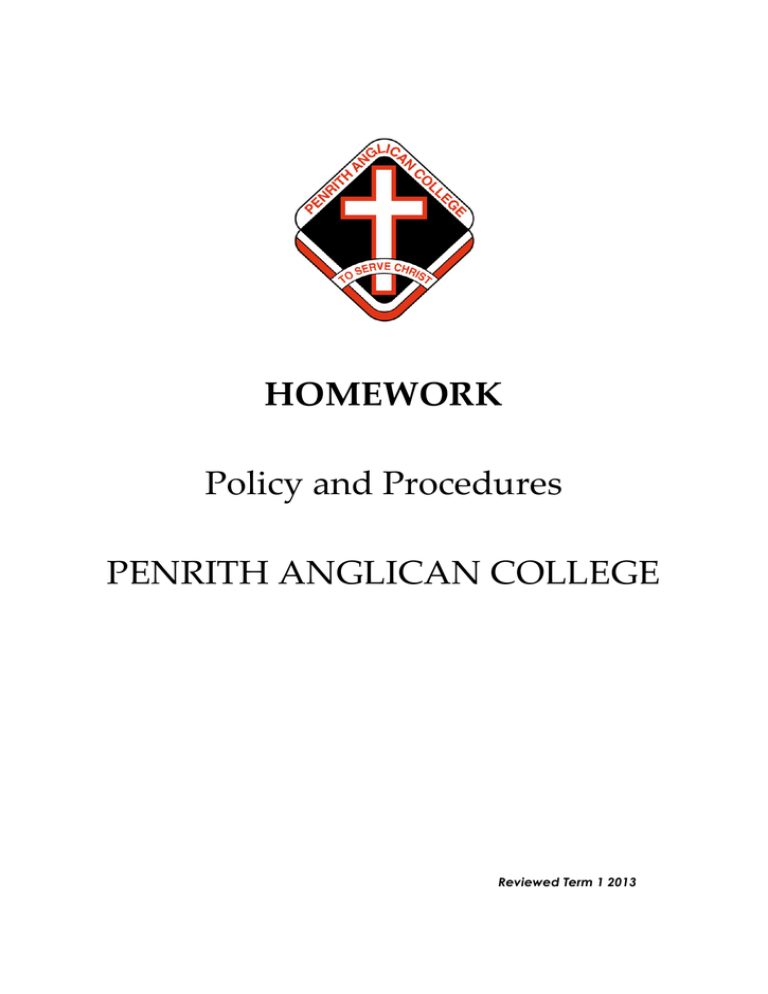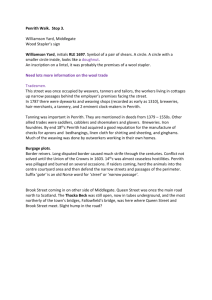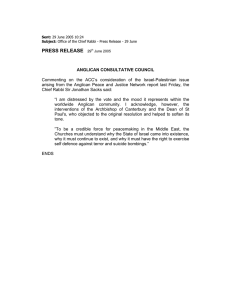HOMEWORK Policy and Procedures PENRITH ANGLICAN COLLEGE
advertisement

HOMEWORK Policy and Procedures PENRITH ANGLICAN COLLEGE Reviewed Term 1 2013 Penrith Anglican College Homework policy Homework policy Recommended timeframes All students are required to do regular home study. Good patterns of home study established early in a student’s schooling can be of great benefit in later years. The following are recommended times to allow students to pursue their own special interests as well as revise and practise different skills. These times are for term time and week days only:Kindergarten None Years 1-2 10-15 minutes per night Year 3 20-30 minutes per night Year 4 20-30 minutes per night Year 5 30 minutes per night Year 6 45 minutes per night Year 7 1 hour per night Year 8 1 ¼ hours per night Year 9 1 ½ hours per night Year 10 2 hours per night Year 11 2 ½ hours per night Year 12 3 hours per night Staff should bear in mind that: • Homework is more beneficial for practise than for new learning (Sometimes we think it’s practise, when it’s really new learning!) • Homework than can not be done without help is not good homework. • Kids need: Downtime Sleep Positive family time Homework they can do on their own Less than a 40 hour work week 1|Page Penrith Anglican College Homework policy Underpinning Philosophy Beliefs about homework “Good teachers give homework”and other beliefs to question How many of these beliefs are based on faith, tradition, or moral judgements? BELIEF # 1: The role of the school is to extend learning beyond the classroom. (It is the inalienable right of teachers, no it’s an OBLIGATION of teachers to extend learning beyond the classroom. Inherent in this belief is the assumption that schools have the right to control the intellectual life of children outside the school and students and parents should comply.) BELIEF # 2: Intellectual activity is intrinsically more valuable than nonintellectual activity. (There is an implied superiority over non-intellectual tasks such as throwing a ball, walking a dog. “Homework is better for kids than television or video games”) BELIEF # 3: The practice of homework has the ability to inculcate positive values in students (The mind is a muscle to be trained, homework teaches time management and responsibility) BELIEF # 4: Lots of homework is a sign of a school with tough standards/rigorous curriculum. (More is better: More time = more learning) BELIEF # 5: Teachers can’t possibly cover all the curriculum without homework. (Implies we are not doing the most efficient job of organising and teaching the curriculum) BELIEF # 6: GOOD teachers give homework/ GOOD students DO their homework. (Probably the most disturbing belief is of the inherent goodness of the practice, regardless of the type or length of the assignment. This belief is so ingrained that teachers apologise to other teachers for not giving homework!) (GOOD students do their homework, therefore it is morally defensible to give failing grades for incomplete homework, thereby punishing laziness and rewarding virtue.) 2|Page Penrith Anglican College Homework policy Research about homework “Homework probably involves the complex interaction of more influences than any other instructional device” (Cooper 1989). “When ever reformers attempt to improve the academic outcomes of American schooling, more homework seems a first step. The justification for this probably has more to do with philosophy (students should work harder) and with the ease of implementation (increase homework costs no extra money and requires no major program modifications) than with new research findings” (Strother in Conners, 1992). “Whenever homework crowds out social experience, outdoor recreation, and creative activities, and whenever it usurps time that should be devoted to sleep, it is not meeting the basic needs of children and adolescents” (American Education Research Association, 1968 in Kralovec and Buell, 2000). “Homework is often the source of considerable friction between teacher and student, child and parent, and teacher and parent. Many paediatricians and family practitioners indicate that problems with homework are a frequent source of concern when children report medical problems.” (Cooper,1998). “Our belief in the value of homework is akin to faith”. (Kralovec and Buell, 2000) Quotes about homework Kid quotes from 4th and 5th grade students at Partridge Elementary School Fort Leonard Wood, Missouri (Selected student responses emailed to me after their teacher asked them to read my article “There’s something wrong with homework”.) “I agree with your point of view. I myself have experienced it for I am a child. Homework is a useless burden that annoys me, my parents, and friends. What is the point of this mental exercise if you already know it? I disagree with homework and the valuable time it takes up”. Sincerely, Charlene, 4th grade student. 3|Page Penrith Anglican College Homework policy “My opinion on homework is that we shouldn’t have any. I think that because kids shouldn’t be doing homework all the time. On the other side, I also think kids should have homework because if they don’t they will be lazy and spoiled.” Sincerely, Jazmin, 4th grade student. “This is my point of view. I say that homework gets you sick and tired of school. And I think a lot of people would agree with me. Then I get more annoyed with the subjects. It gives me really bad headaches. That is my opinion.” Sincerely, Sid, 4th grade student. “I myself find homework to be bad. Homework makes me very frustrated. I have to ask my Mom to help so much she even gets frustrated. After I am done, I want to go outside, but I can’t because it took so long to finish. The next morning I will wake up and wish a snowstorm would have come and school would be cancelled. That is why I agree with you.” Sincerely, Jonathan, 5th grade student. “In my opinion, homework is boring, and a waste of time. Homework takes up valuable kid time which we won’t have much longer. I think homework just flushes our playtime down the toilet.” Sincerely, Jason, 4th grade student. 4|Page Penrith Anglican College Homework policy Too much Homework? Do kids today have more homework? Yes. The Institute of Social Research at the University of Michigan conducted a survey of 2,394 households, including 3,600 children ages 3 to 11. Their study showed homework had increased. Minutes doing homework each week Age group 3 to 5 6 to 8 9 to 11 1981 1997 12 44 169 36 123 217 NO. The Brookings Institution claims the media has exaggerated claims of increased homework. (Loveless 2003) Students were asked “How much time did you spend on homework yesterday?” Age 9 1984 1999 36% 26% Age 13 1984 1999 23% 24% Age 17 1984 1999 22% 26% None assigned Did not do it 4% 4% 4% 5% 11% 13% < 1 hour 41% 53% 36% 37% 26% 26% 1-2 hours 13% 12% 29% 26% 27% 23% > 2 hours 6% 5% 9% 8% 13% 12% (Loveless, 2003) National Assessment of educational Progress) Parents were asked “What do you think of your child’s homework load?” About the right amount 64% Too much homework 25% Too little homework 10% (Loveless, 2003) (Public Agenda, 2000) Big picture of homework research • Research on homework has not been well-designed • Results are inconclusive, sometimes contradictory • Studies cannot show that homework causes higher achievement • Both sides of the homework debate claim Cooper’s research supports their views (Cooper’s Research shows a correlation between homework and achievement). 5|Page Penrith Anglican College Homework policy Cooper’s Synthesis of Research on Homework (Cooper, 1989) (Vatterott’s remarks in brackets) Homework appears to be positively correlated with achievement, but the effect varies dramatically with grade level: • in grades 3 to 5, correlation nearly zero • in grades 5 to 9, correlation .07 • in grades 9 to 12, correlation .25 (correlations do not show cause and effect, remember .00 is no correlation, 1.0 is a perfect correlation). Amount of Homework For elementary students, no amount of homework--large or small--affects achievement. For middle school students, achievement improves slightly with more homework until assignments last between one and two hours a night. However, students doing 15 minutes to 1 hour of homework perform as well as students spending 1-2 hours. There appears to be no benefit to more than 1 hour a night. For high school students, achievement appears to improve until students are doing about 1 ½ - 2 hours a night. At that point achievement begins to decline. (Does more homework increase achievement or do high achievers do more homework) (Time management experts claim that productivity declines after an 8 hour day.) Homework appears to be more beneficial for rote memory, practise, and rehearsal of a skill already developed than for complex tasks that require integration of knowledge and skills. The 10- minute rule Maximum of 10 minutes per grade level per night (6th grade = 60 minutes) Suggested maximum total amounts of nightly homework (recommended by the PTA and the NEA) (recommended time spent on all subjects combined) (the 10 minute rule is consistent with the research) NB The time is calculated by how long it takes the student to actually do the homework! 6|Page Penrith Anglican College Homework policy The parents’ perspective In a recent Public Agenda survey: • 50% of parents responding said they had had a serious argument with their child in the past year over homework • 34% reported that homework was a source of struggle and stress with their child • 22% said they had done part of their child’s homework because the child was too tired to complete it. In a survey of special education parents: 1. Parents felt inadequately equipped to help their children with their homework. They didn’t trust that the methods they had used to learn reading or maths were still appropriate for their children. They wanted to know more about the concepts and skills (the curriculum) that were being taught to their children. 2. Parents needed more information about the teacher’s expectations of the child and what their role should be in helping. 3. Parents believed that homework should be tailored to the individual, to respect child and family needs. Parents wanted accommodations for special education students, and scheduling accommodations for things like sports, religion classes, and divorced parent’s visitations. 4. Parents valued and even enjoyed hand-on homework and projects in which the whole family could participate. 5. Parents wanted an extensive two-way communication system that would allow them to become partners on their child’s instructional team. (Fitzgerald, Paradee, and Mellencamp, 1994) Schools need to do 3 things for parents: • Teach parents how to supervise homework • Provide a system of two-way communication for teachers and parents • Adjust homework assignments to meet individual student and family needs. Barry Roots HEADMASTER Reviewed May 2010 7|Page Penrith Anglican College Homework policy PARENT FEEDBACK CHECKLIST (attach to homework) Dear Parent: I estimate your child can complete this assignment in…………..minutes. It is not necessary for your child to work longer than………….minutes on this assignment, even if they do not finish it. They will not be penalised. How much time did your child spend on this assignment?.......................... If your child did not finish the assignment, please check the reason or reasons why below: ………..my child could no longer focus on the task ………..my child was too tired ………..my child did not understand the assignment ………..my child did not have the necessary materials to complete the assignment ………..my child did not have enough time due to other outside activities …………other reasons (please explain) ………………………………………………………………………………………………… …………………………………………………………………………………. …………………………………………………………………………………………. ……………………………………………….. Parent’s signature 8|Page Penrith Anglican College Homework policy HOMEWORK GUIDELINES Homework guidelines for the classroom 1. Explain to students the learning purpose of each homework assignment (i.e. practise, preparation, checking and understanding). 2. Start small/give less, perhaps 10-30 minutes a night until students are regularly completing homework. 3. Make it fun – give students choices, have students create personalised products or presentations. 4. Reward homework completion (i.e. whole class charts, showing off homework, other incentives). 5. Don’t punish students for not doing homework (punishing makes it a power struggle). 6. “There’s no not doing it” (mandatory after-school homework clubs, catch-up days where others have free choice of learning activities). 7. Differentiate assignments for special needs students. The best homework assignments meet developmental needs and: • • • • • • • • are socially interactive with peers or adults allow students to feel competent allow students to express their feelings or opinions allow students to share information about themselves or their lives require hands-on learning or other physical activity require positive contact with parents allow for student choice are adaptable to individual needs e.g. - time allocations - different ways of presenting homework 9|Page Penrith Anglican College Homework policy Piscataway Township School District, Piscataway, New Jersey Homework Policy 2003. The Piscataway Township School District in Piscataway, New Jersey drew national attention in 2000 when it implemented a policy limiting homework. The school board in this district of about 7,000 students limited homework on weeknights, from 30 minutes in elementary school to two hours in high school, “discouraged” homework weekends, and prohibited teachers from grading it or using it as punishment. The Board of Education believes that homework assignments at all grade levels provide a meaningful extension of student learning experiences and help students develop initiative, independence, and a sense of responsibility. Homework assignments are made on a regular basis by teachers at all grade levels, with such assignments being appropriate to the age and grade level and to the needs and abilities of the learner. Assignments are to be meaningful and should reinforce or enhance classroom learning. The Superintendent shall develop and implement appropriate homework guidelines: 1. Homework is a properly planned part of the curriculum, extending and/or reinforcing the learning experience. 2. Homework helps children learn by providing practise in the mastery of skills and integration of knowledge. 3. Homework helps develop pupil responsibility and provide an opportunity for the exercise of independent work and judgement. 4. The number and frequency of homework assignments should take into account other school activities that make a claim on the pupil’s time. 5. As a valid educational tool, homework will be clearly assigned and its product evaluated to assess learning. Informal evaluation will be reported to the pupil. 6. Parents will be informed of ways in which they may assist the school in helping a child carry out assigned responsibilities. 10 | P a g e Penrith Anglican College Homework policy 7. Homework will always serve a valid learning purpose; it should never be used as a punitive measure. 8. Homework will not be graded. Parents will be notified if homework is not completed. Regular projects such as research papers and long-term projects will be graded. 9. Weekend and holiday homework is discouraged and shall only be assigned if a new concept is introduced on a Friday and/or the day before the holiday. Make-up homework , long-term projects, and research papers could be assigned over periods that include weekends and/or holidays. 10. Suggested total times for daily homework: Kindergarten Teacher discretion Grades 1-3 0-30 minutes Grades 4-5 0-50 minutes Grades 6-8 0-75 minutes Grades 9-12 0-120 minutes 11. Homework should not be started and/or completed in class. 12. Students who complete homework will be given up to an extra ten (10) percent on their marking period average as an incentive to complete assignments. 13. Teachers are responsible for offering meaningful and reasonable assignments and family members are encouraged to be actively involved in the homework process. The Piscataway homework policy does 4 great things: • It states their beliefs about the value of homework • It prohibits the grading of homework • It prohibits homework as punishment • It sets upper limits on amounts but also gives teachers the discretion to not assign work. 11 | P a g e




